#Death of Abraham Lincoln
Text
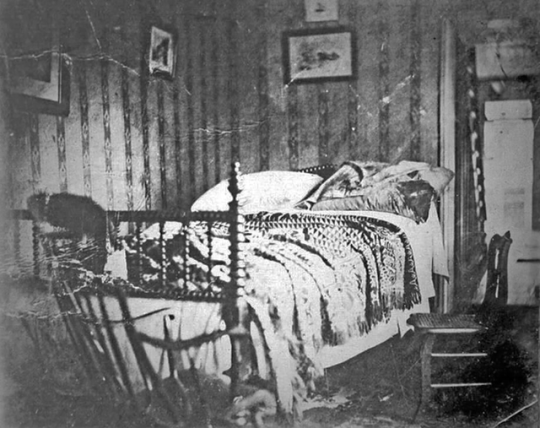
After President Abraham Lincoln was shot during a performance of Our American Cousin at Ford's Theatre, several doctors who were in the audience and also enjoying the play rushed into the Presidential Box and began attending to the President. It was clear that Lincoln's wounds were almost certainly mortal, but the doctors still attempted to save his life. Originally thinking that the President had been stabbed, they soon found that he had been shot behind the left ear and the bullet -- a 43.75 mm ball which had been fired by John Wilkes Booth's .44 caliber Derringer -- had sliced through Lincoln's brain and lodged behind his eye sockets without exiting the skull. When Lincoln's breathing became more shallow, Dr. Charles Leale used his finger to remove blood clots from the wound, which immediately improved Lincoln's respiration.
The doctors decided to move Lincoln from the theater, but felt that the President's condition was far too weak to risk taking him back to the White House, which was several blocks away. A nearby saloon was considered just as unseemly of a place for the President to spend his last hours and likely die in as a theatre, so Lincoln was carried across the 10th Street to William Petersen's boarding house. When they brought Lincoln into the boarding house, they realized that the 6'4" President was too tall for the bed they found for him, so they laid him diagonally upon it.
It was obvious that Lincoln could not survive his wound, so the attending doctors simply tried to keep him comfortable in his final hours by clearing the blood clots in his skull that caused his breathing to become more labored. Throughout the night, the President never regained consciousness, but witnesses said that he looked peaceful as his life was drawing to a close. The only visible evidence of his mortal wound were the bloody pillows that his head rested on and the raccoon-like bruising around Lincoln's eye sockets due to the orbital bones fractured by Booth's bullet after it passed through his brain. Nine hours after he was shot, Lincoln died in Petersen's Boarding House at the age of 56.
Shortly after the President was pronounced dead, his body was placed in a coffin and transferred back to the White House in a carriage. Just a few hours later, one of the residents of Petersen's Boarding House, Julius Ulke, took a photograph (seen at the beginning of this post) of the room and the bed -- including a pillow soaked with the President's blood -- where Lincoln had died earlier that morning.

The room in Petersen's Boarding House where Abraham Lincoln died, pictured in 2007.
#History#Abraham Lincoln#President Lincoln#Death of Abraham Lincoln#Assassination of Abraham Lincoln#Lincoln Assassination#Presidents#Presidential History#Presidential Assassinations#John Wilkes Booth#Assassins#Assassinations#Political History#Civil War#Civil War History#Petersen's Boarding House#Ford's Theatre#Presidential Deaths#Our American Cousin
166 notes
·
View notes
Text
I witnessed Abe Lincoln’s assassination and got dragged into hunting for John Wilkes Booth.
320 notes
·
View notes
Text
Tw for gore and medical talk
So we (probably) know that Alastor died from a gunshot wound to the head, and that hunting dogs may or may not have been involved right?
But we don't know the details
See a lot of people assume that a bullet to the head = instant death but in fact we really only need certain parts of the brain to live. Those parts are mostly located at the lower back of the head, far away from the frontal lobe
So consider with me, Alastor is shot straight on in the forehead with a .22 hunting rifle, the bullet enters his head and either bounces around in his skull, turning his brain to paste
Or
It exits somewhere through the parietal bones or upper occipital, leaving him alive if rather scrambled. Intracranial pressure increasing as he bleeds into his brain.
Alastor then slowly loses consciousness on the forest floor as a pack of snarling hunting dogs closes in around him, sealing their bared teeth as his final memory
For added angst, he lives a while even after losing consciousness
He is brought to his mother, who holds his hand as he takes his last stuttering agonal breaths, completely oblivious to the fact that she's by his side
#seriously tw#gore#gunshot wounds#death#alastor#alastor the radio demon#alastor hazbin hotel#hazbin hotel alastor#alastor's mother#hazbin hotel#hazbin hotel headcanon#hazbin hotel whump#hazbin alastor#original#i contributed#this is deranged#Abraham Lincoln was shot point blank in the back of the head and he still lived for several hours#alastor whump#whump
30 notes
·
View notes
Text
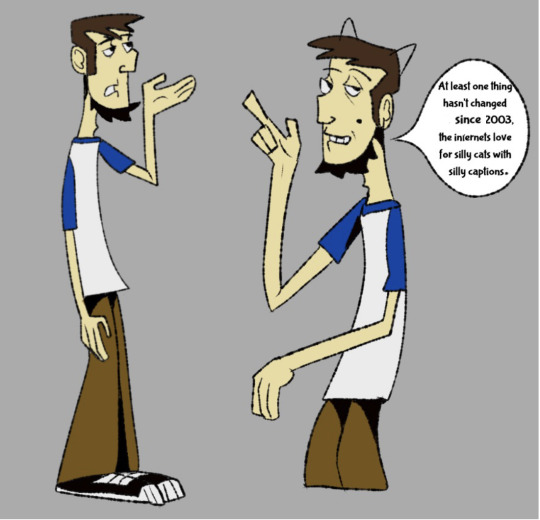
fixed the grammer error that i didn’t notice till like 5 hours later embarrassing ugh
#clone high#clone high abraham lincoln#ch abe lincoln#abraham lincoln#kind of glad i posted it during clone high tag death
30 notes
·
View notes
Text

me? infodumping about the Abraham Lincoln centric musical I’m writing? HELL YEAH HERE WE GO!
This project has been in development for the last several years, and I unabashedly adore it more than anything I’ve worked on before. So uh … you’re gonna get a preview of it in the form of snack pack sized facts whether you like it or not.
SUMMARY: “𝐖𝐈𝐓𝐇 𝐌𝐀𝐋𝐈𝐂𝐄 𝐓𝐎𝐖𝐀𝐑𝐃 𝐍𝐎𝐍𝐄: 𝐀 𝐍𝐄𝐖 𝐌𝐔𝐒𝐈𝐂𝐀𝐋” dives deep into the tortured psyche of Abraham Lincoln and tells the story of our Sixteenth President’s tumultuous years in office like it has never been told before.
Orchestrally, it holds the most similarities to Les Misérables, Hello Dolly, Newsies, and Anastasia. The narrative structure of the production is comparable to Evita, Jekyll and Hyde, and Hadestown.
this production will be A STUDY IN … the five stages of grief, leadership during turbulent times, the joys of fatherhood, spirituality and the occult, the quest to discover and establish one’s self-identity, courage in its many forms, collaboration between opposing personalities for the sake of the greater good, the transformation of a team to a brotherhood, legacy and the historical narrative, mental health, personal agency, and the horrors of war.
The musical is narrated by Robert Todd Lincoln, who in 1922 at the Lincoln Memorial’s dedication strives to clear away misconceptions regarding his father. Similar in archetypal design to Evita’s Che and Hadestown’s Hermes, he tells the musical’s story as a flashback, and has an omniscience granted to him by historical hindsight. He tells the story so that history won’t repeat itself and no matter how much he wishes to do so, it cannot be altered.
Although it certainly appears otherwise at first, there are no human antagonists within this storyline. William Henry Seward deceives the audience into believing that he is the antagonist during act one; however, this character arc is resolved by the development of his friendship with Lincoln. The real antagonists are the institution of slavery, the civil war itself, and Lincoln’s own depression.
Rather than the Gettysburg Address or Emancipation Proclamation, Willie Lincoln’s death is Act One’s final scene. This creative decision was made to highlight the show’s focus on mental health, and to render the Civil War an entirely personal affair. The last number of Act One offers the audience a glimpse into Lincoln’s personal struggle with the death of his son. In the timespan of a single musical number, he speedruns the Five Stages of Grief, eventually accepting that his son is dead and he must persevere through the pain. If he crumbles, more fathers will lose their sons.
The second part of Act Two’s opening number sheds light on Mary’s approach to the grieving process. Upon realizing that she became “so devoted to [our] political advancement” that she neglected her religious beliefs, Mary begins to wonder whether she was to blame for Willie’s demise. Robert briefly abandons his role as narrator to become Mary’s subconscious mind, poisoning her thoughts with the concept that Willie was struck down by a higher power as punishment for sinful behavior.
There are several musical numbers and scenes whereupon Abraham communicates with two versions of himself — version one being the nine year old Abe, and version two being the Abe that has just arrived in Springfield. From his younger selves, he seeks advice, reassurance, and listening ears.
That’s all the details you’ll get for now, folks! Feel free to reach out if you want to be part of the creative team for this show, or even just to suggest an idea.
#can y’all tell that this show is being written by an English Lit major yet?#musical theatre#american civil war#abraham lincoln#history#american history#broadway#child loss tw#child death mention#tw grief
26 notes
·
View notes
Text
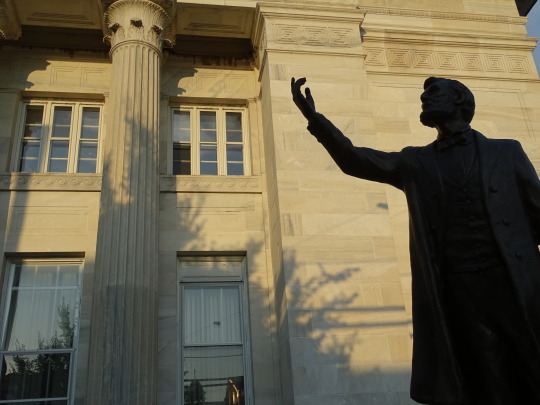
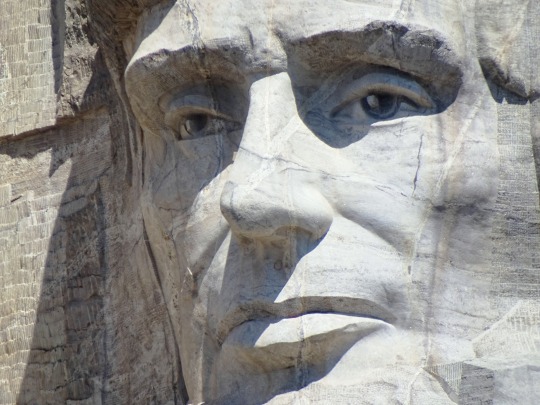

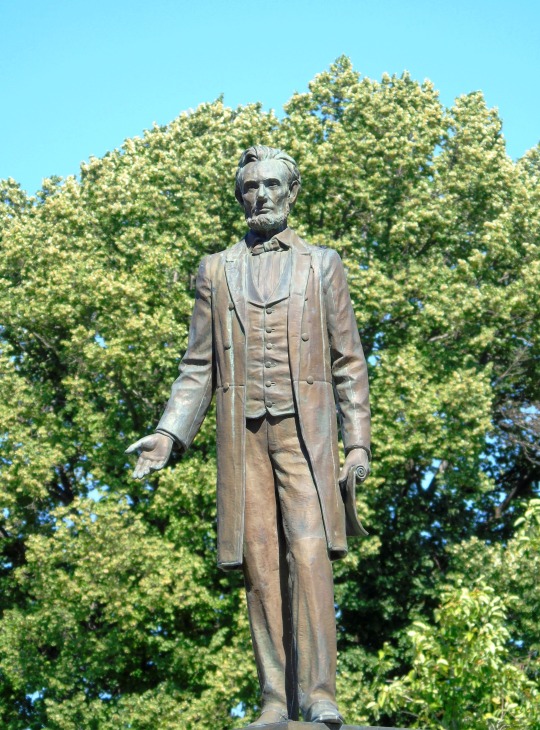

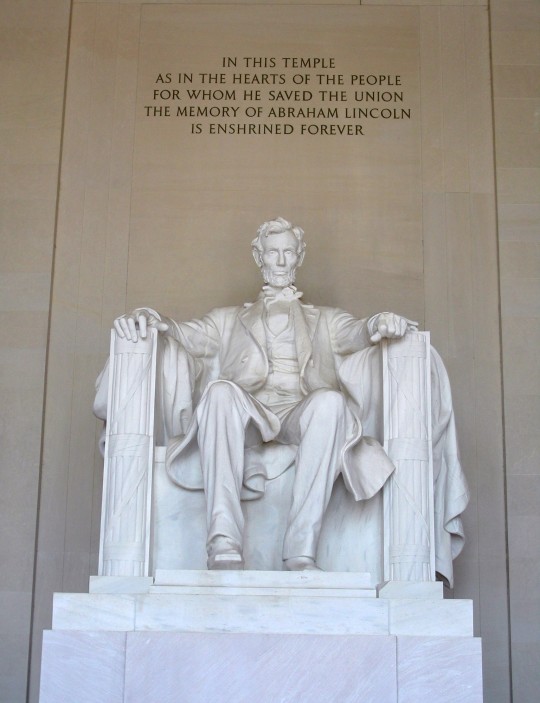


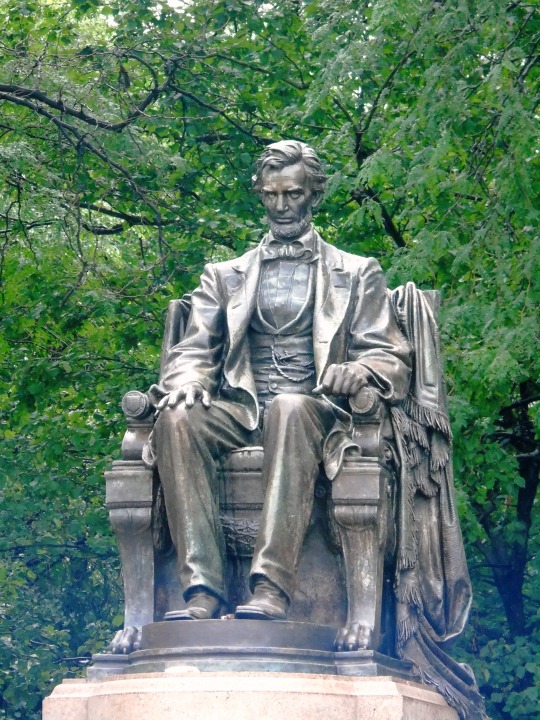


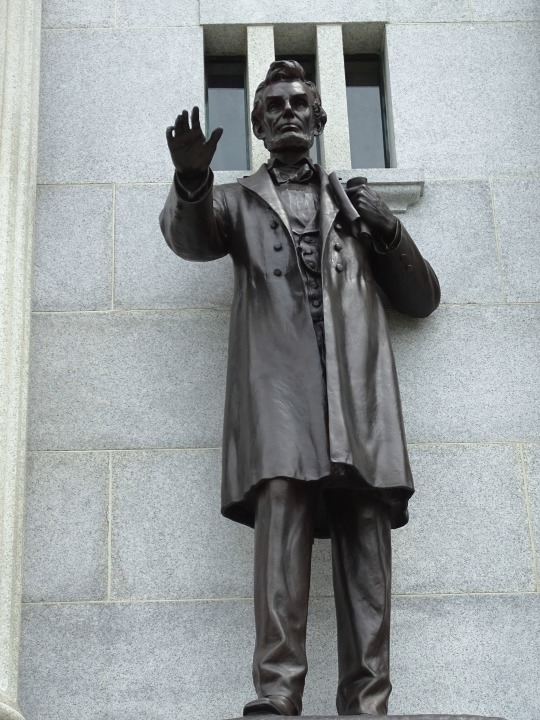

President Abraham Lincoln died on April 15, 1865 after being shot the previous evening by actor John Wilkes Booth.
#Robert Russin#Mount Rushmore National Memorial#Gutzon Borglum#USA#J. Otto Schweizer#Gettysburg National Military Park#Henry K. Bush-Brown#Stanley J. Watts#Abraham Lincoln#died#death#15 April 1865#US history#anniversary#original photography#sculpture#tourist attraction#summer 2019#travel#vacation#Daniel Chester French#landmark#architecture#cityscape
2 notes
·
View notes
Text
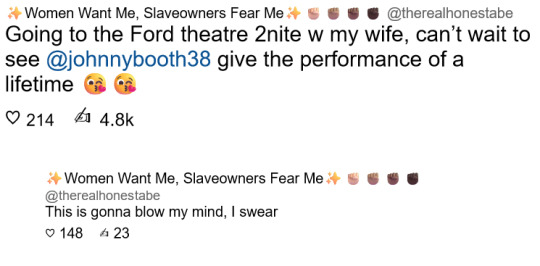
#funny#cw death#(implied)#abraham lincoln#john wilkes booth#if this looks shit it's because i made it in google docs with my friend. not actual twitter
2 notes
·
View notes
Text
The Force of July (Abraham Lincoln Carlyle, Lady Liberty, Majory Victory, Mayflower, Silent Majority, and Sparkler) got in a lethal battle with Task Force X (The Suicide Squad) in Suicide Squad 27# (cover date May, 1989). The conflict saw the murder of Abraham Lincoln Carlyle, Mayflower, and Sparkler. ("The Janus Directive 2: Scattermove", Suicide Squad 27#, Comic, Event)
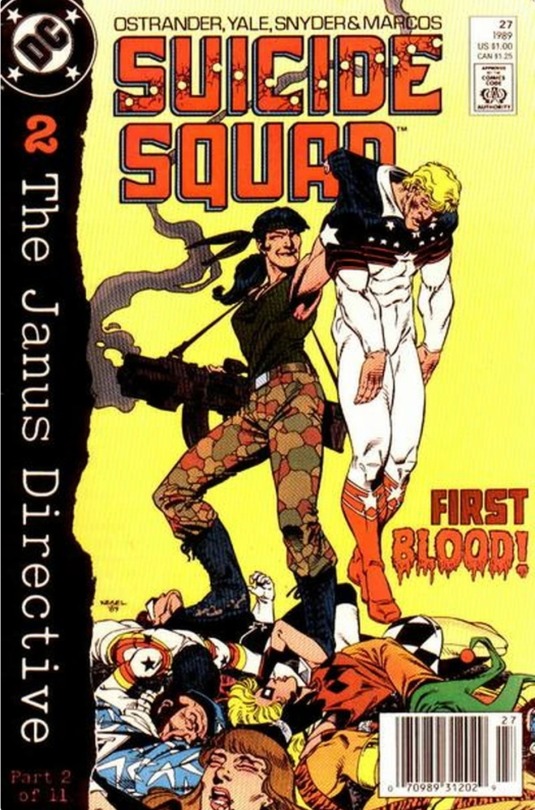
#nerds yearbook#real life event#comic book#dc#dc comics#may#1989#death#john ostrander#kim yale#john k snyder III#suicide squad#task force x#force of july#abraham lincoln carlyle#mayflower#sparkler#janus directive#checkmate#amanda waller#project atom#project peacemaker#bronze tiger#captain boomerang#count vertigo#doctor light#duchess#ravan#punch#jewelee
6 notes
·
View notes
Text
So my friend @soft-witchy remembered I love fucked up coins and saved me a damaged (read: has a bullet hole in it) penny from their work BUT LIKE. THE PLACEMENT OF THE HOLE COULD NOT HAVE BEEN WORSE

LIKE STOP STOP MY BOY ABE HAS BEEN THROUGH ENOUGH LMAO
6 notes
·
View notes
Note
(Nutjob anon)
I was going through some of my old playlists, and found this gem.
I think a couple of us can agree this is the anthem for Oc!Mc!
JFISOSO WAIT I LOVE THAT YT CHANNEL POSTMODERN JUKEBOX (MY ABSOLUTE FAVE IS THEIR HABITS & TOXIC COVER DHJSKAO)
YES. ABSOLUTELY. IT IS SO PERFECT FOR THEM. IT'S SET IN 1920S TOO HDJAIAOQQ.
I SHALL GRACIOUSLY ACCEPT THIS BRAINROT FUEL. THANK YOU NUTJOB ANON!!!
Edit: let me just elaborate how i fricking love this as Capo!Reader's theme–
I kind of have Khaenri'ah as this story's version of America. American Dream = Khaenri'ahn Dream, etc. Before the reader became an immigrant they were always looking for a way to gain more power and money because they were born in a poor orphanage ("I was raised by the streets"). As one of the oldest, they were even tasked with looking out of young kids like Kaeya.
"As I croak I see myself in the pistol smoke"
"Like on my knees in the night, saying prayers in the street light"
"Death ain't nothing but a heartbeat away. I'm living life do or die."
"I'm 23 now but will I live to see 24?"
I'm 😭–
#ansytea talks#tag: ocmc - cta#HEJAISOAO YES YES#nutjob anon#MOST OF READER'S DEATH ARE RELATED TO GUNS#I KEEP PLANNING THAT THEYD DIE GETTING SHOT BECAUSE OF I WANT THEM TO SHARE SIMILAR FATES TO ABRAHAM LINCOLN FOR MOTIF PURPOSES FHSKKSOS
5 notes
·
View notes
Text
How are there still 35 minutes left in this movie what else can possibly happen
#rehks rants#his son was killed by a vampire#how fucking crazy that they used this real guy's real kid's death#and said 'it was a vampire'#abraham lincoln vampire hunter
4 notes
·
View notes
Text

"Graphic art was powerless before a face that moved through a thousand delicate gradations of line and contour, light and shade, sparkle of the eye and curve of the lip, in the long gamut of expression from grave to gay, and back again from the rollicking jollity of laughter to that far-away look."
-- John G. Nicolay, Abraham Lincoln's private secretary
•••
To borrow one of his most famous oratorical devices, it was ten score and 15 years ago that Abraham Lincoln entered life and began one of America's most unlikely and extraordinary journeys, and 159 years since that journey ended because of an assassin's bullet. To us, Lincoln will always be a statue; a painting; a bust on Mount Rushmore; a monument on the Washington Mall; a solid, stoic, staid symbol staring back at us from a dull, green five-dollar bill, a rusty-looking penny, or a black-and-white photograph. Yet, he was one of us -- a human just as colorful as any American that has ever existed, and through his rise and his triumph, he told us a story that Republicans claim as the standard for their party, that Democrats claim as the inspiration for their party, and that Independents of all backgrounds do not dare to turn away from.
Lincoln's story is so extraordinary that we don't even think of him as a member of our species. He's on a higher level. He's almost mythological. A legend. We see his face like we envision the face of God. The halo surrounding him almost downplays the fact that he lived the same way we live. He needed oxygen and water and food. We all have sensitivities about how we are perceived by others, and Lincoln was no different. To many of his contemporaries, he was a freakishly tall, gangly, ugly man. During his life, people called him a "baboon" and "a barbarian." The man that Lincoln placed in command of all Union troops, General George B. McClellan, referred to the President as "the original gorilla." They made fun of his high-pitched, nasally voice. They made fun of his country accent -- the way that he pronounced "chair as "cheer" and said "hain't" instead of "haven't." They laughed at his careless clothing choices, and snickered at the fact that he never combed his hair. When he delivered the Gettysburg Address in 1863, one Pennsylvania newspaper wrote, "We pass over the silly remarks of the President. For the credit of the nation we are willing that the veil of oblivion shall be dropped over them, and they shall be no more repeated or thought of."
In Lincoln's lifetime, more people probably rolled their eyes instead of listened intently when he launched into yet another backwoods joke or funny anecdote that he couldn't stop repeating. He had family problems. His mother died when he was very young, and he had lifelong daddy issues. His borderline crazy wife was domineering, emotionally (and allegedly physically) abusive, and his young children ran roughshod over the White House. He had no real close friends and experienced devastating heartbreak -- including a love that was lost and the deaths of two of his young children. He was simultaneously considered inexperienced and weak, heavy-handed and harsh.
"Honest Abe" was the cleverest, sharpest, and most vicious politician of his time. The gentle and joking country politician destroyed his enemies, threatened his opponents, and steamrolled his rivals. This beacon of liberty and protector of freedom bypassed the Constitution and suspended Habeas Corpus. Abraham Lincoln began his Presidency intending to save the Union in whichever way possible -- even if it meant allowing slavery to continue. The "peculiar institution" was abhorrent to his beliefs, but an acceptable sacrifice if the result was the Union's survival. Until he finally reached a point where he recognized that the sacrifices being made during the Civil War were exactly the kind of bloody price that needed to paid to cleanse the nation of its original sin of slavery.
Like many, if not all, of our greatest leaders, Abraham Lincoln was a man full of paradoxes. Beneath the solemn visage that was Lincoln's complex face was a cheerful, jovial, informal man who loved nothing more than a good joke or a witty story. Yet, further beneath that genial layer was also a dark, depressed man who lost the love of his life when he was young, seriously considered suicide on numerous occasions, felt unsatisfied with his accomplishments and about his qualifications, and faced the death of his favorite child while he wrestled with the biggest crisis that this country has ever faced.
Lincoln may have have been our nation's greatest orator, perhaps even America's greatest pure writer. His writing -- and not just his speeches, but his private letters and messages to Congress -- is memorable and poetic. If the Civil War was a symphony, his words were the lyrics to its beautifully terrible music. When the war was going badly, he used his words to simultaneously challenge his generals, assuage the public, and exert his control over the many crises his country faced. When the war was going well, his words were soothing, inspirational, and a bridge to the South that invited capitulation without humiliation. Lincoln's words were the words of a writer who spent all of his life studying the English language, yet Lincoln was largely self-educated by the light of a candle in a dark, damp log cabin.
We will never know why it was Abraham Lincoln -- a virtually unknown frontier lawyer who had served just one term in Congress a decade before he even ran for the Presidency -- who was destined to lead the United States through the Civil War, but can we even imagine another person equipped to do so? Like a shooting star, Lincoln appeared and against all odds, he saved the Union. Then, when the war ended, he disappeared again. Not a day earlier or a day later, either -- on literally the first day that he truly felt that the Civil War had ended, Abraham Lincoln was assassinated, arguably the last casualty of the Civil War.
So, the next time you think that all hope is lost or that you've failed at something or that you are "only human," think or Abraham Lincoln, who overcame a lifetime of obstacles and challenges and failures to save the Union that he loved and believed in and became a legend and hero to the world today. Remember that we are "only human," but so was Abraham Lincoln. You could be a lot worse off than being "only human."

The rocking chair that President Lincoln was sitting in when he was shot by John Wilkes Booth on April 14, 1865, now on display at the Henry Ford Museum, Dearborn, Michigan.
#History#Abraham Lincoln#President Lincoln#Civil War#Death of Abraham Lincoln#Assassination of Abraham Lincoln#Lincoln Assassination#Presidents#Presidential History#Lincoln Administration#Lincoln#Politics#Political History#Civil War History#Anniversary of Lincoln's Death
21 notes
·
View notes
Text
I was a time traveler and I got transported to the 1800s to kill Queen Victoria's assassin. The assassin was the guy who murdered Abraham Lincoln.
570 notes
·
View notes
Text
Five Biggest History Conspiracy Theories
My five favourite history conspiracy theories - a guilty pleasure at yuletide!
#history
Conspiracy theories are nothing new. We’re more aware of them today thanks to the ceaseless buzz of social media. But back in ancient Rome, Nero was blaming Christians for burning down the city. While in Stuart London after the Great Fire of 1666, a monument was erected pointing an accusing finger at Roman Catholics as devious arsonists.
What’s often not recognised is the extent to which…
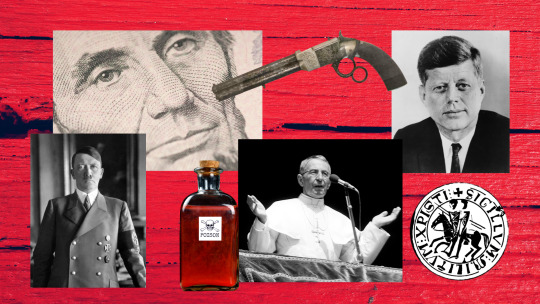
View On WordPress
#Abraham Lincoln assassination#conspiracy theories#conspiracy theory#David Yallop#death#Godfather III#history#Hitler alive#JFK assassination#John Paul I murdered#Knights Templar origins#Nazis south America#Priory of Sion
2 notes
·
View notes
Text
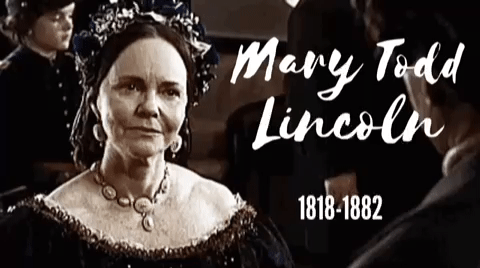
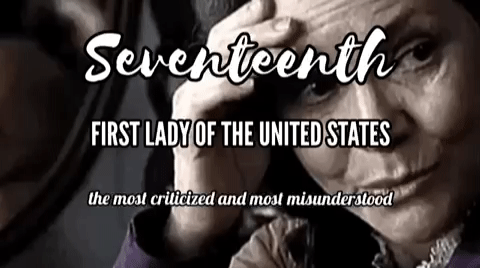
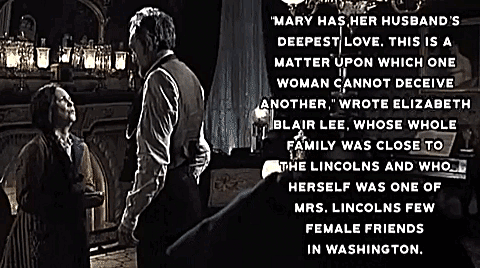
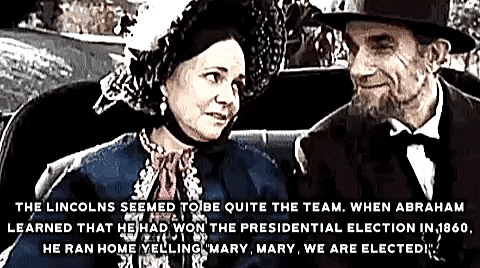
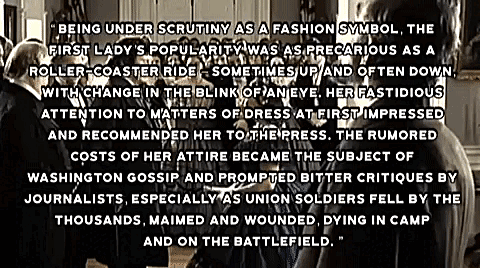





Lincoln (2012) - Dir. Steven Spielberg
Sally Field as First Lady Mary Todd Lincoln, the fiercely ambitious and high-spirited woman who made Abraham Lincoln President of the United States.
“In her bearing she was proud, but handsome and vivacious; she was a good conversationalist, using with equal fluency the French and English languages. When she used a pen, its point was sure to be sharp, and she wrote with wit and ability. She not only had a quick intellect but an intuitive judgment of men and their motives. Ordinarily she was affable and even charming in her manners; but when offended or antagonized she could be very bitter and sarcastic. In her figure and physical proportions, in education, bearing, temperament, history — in everything she was the exact reverse of Lincoln.” — Alexander K. McClure, Lincoln’s Own Yarns and Stories
inspired by @winterhalters [ post ]
#history#perioddramaedit#abraham lincoln#perioddramacentral#gifshistorical#american civil war#tw death#tw slavery#american history#film edit#gifset#acw#perioddramasource#historical edit#women in history#mary todd lincoln#apush#ap us history#daniel day lewis#period drama#lincoln 2012#media: lincoln (2012)#calliestag#femalegifsource
62 notes
·
View notes
Text
The radical Empire, calling on the memory of Abraham Lincoln, warned against the vengeance of the Lord:
If the late President of America, looking sorrowfully on the long continuance of the mutual havoc of his countrymen and remembering the much longer continuance of slave-holding atrocities, was impressed with the thought that "for every drop of blood shed by the lash, GOD in His justice might have determined that a drop of blood should be shed by the sword," has not every settler in Queensland reason to fear that in some terrible manner, the blood of murdered aborigines will return upon the heads of a community who have allowed hundreds of them to be slain without even the semblance of just cause?
"Killing for Country: A Family History" - David Marr
#book quotes#killing for country#david marr#nonfiction#the empire#newspaper#journalism#radical#memory#abraham lincoln#warning#vengeance of the lord#president of the united states#murder#death#bloodshed#indigenous australians#aboriginal australian#settlers#colonization#just cause
0 notes